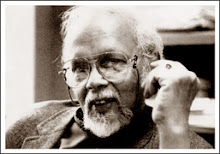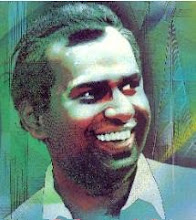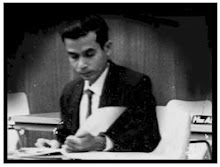Author: Farah Macan Markar Source: Sunday Observer Date : 12 June 2005
| |
She is a Sri Lankan playwright and director. Her plays have been performed in Colombo, Bangalore, Mumbai, London, Manchester, New Delhi, Manila, Tokyo, Washington and Australia. Her name is Ruwanthie de Chickera.
Born in 1975, Ruwanthie studied in Methodist College, Colombo which was where she first took up to writing drama, working on scripts for inter-house school plays. She had written a couple of poems and short stories before, but it was while scripting drama that her writing became more serious and focused.
An avid reader as a child, and still very much so today, Ruwanthie more or less grew up on Enid Blyton, and moved on to "Just Williams" to Leon Uriss and Jeffrey Archer. Her present reading interest are translations and non-fiction. Among her favourite authors are Milan Kundera, Margaret Atwood and Arundathi Roy.
Together with the influence of her passionate love for books, it was her interest in theatre, which made her want to write. "I'm interested in the art of theatre, which I find in many aspects challenging. My writing stems from a desire to expand an art form and communicate it to the people", says Ruwanthie.
This can be clearly seen in her writing in which she experiments not only with the language, but form, character and subject matter. Each of her six plays has a substantially different style and tone.
Ruwanthie says, "I don't want to pigeon hole myself into a select form of writing, but be free to express my ideas the way I want".
Ruwanthie's writing changes, depending on what she wants to do with a particular project. She tries to stay as simple as possible, without making her writing overly academic or dictated. She tries to avoid writing on themes and instead focuses on a particular subject, which is generally a person. In her writing, she tries to bring something out of his life and character. She is interested in psychology, in individuals and individuals in relation with society. Her writing comes from a combination of observation, imagination and experiences.
As much as she loves the English Language and Literature Ruwanthie wants to broaden her horizons. Her interest is not only in the English Language. Her plays are bilingual and some even multilingual. Ruwanthie says, "My interest is beyond the English speaking audience. I want to engage with the reality of the situation, and try to show this in my writing".
Her first play Middle of Silence written when she was just 19 years reflects her deep insight into human behaviour and relationships. It is a dark play about the power struggle between a husband and wife.
The play won the British Council International New Playwriting Award for South Asia in 1997 and the Gratiaen Award for the best English creative writing in Sri Lanka in 2000.
It was the first Sri Lankan play to be performed at the West End (produced by the 'Royal Court Theatre' in 1998). Middle of Silence was subsequently performed in Colombo by the 'Workshop Players' and in Bangalore and Mumbai by the 'Artists' Repertory Theatre' in 1999. In 2004 it was translated into tagalog and produced in the Philippines by the 'Cultural Centre of the Philippines'.
In her second play Two times Two is Two Ruwanthi wanted to explore with art form. She realised it wouldn't hold unless the characters were three-dimensional, so she made them so. It was also a play based on observation. Two times Two is Two was short-listed for the World Student Drama Trust Award in 1998 and was critically acclaimed by Colombo audiences, being re-run on popular demand, five times in Colombo.
In 2004, it was selected for performance at the Bharat Rang Mahotsav (National Theatre Festival) organised by National School of Drama, New Delhi.
Her third play, The Brick Layer was produced at the Contact Theatre in Manchester in 2002. Her most recent work was two one-act plays- The Jony and Urvashi Show and The Blind Poet based on the work of Indian writer Mahasweta Devi and presented by the University of Colombo and Stages Theatre Group. The production, titled a poet, a puppet and papadam went on the boards in January 2004.
Ruwanthie's directorial debut was her own play Two times Two is Two. Of directing her own plays Ruwanthie says she tries to approach it, as an outside director would, not as a playwright. "Ideally though", she says " a good script is enhanced by the viewpoint of a different director, not the playwright".
Ruwanthie's production Checkpoint-three strangely normal plays introduced Colombo audiences to the concept of Forum theatre. Last bus eke kathawa translated and directed by her was performed in Colombo, India, Manchester and Tokyo.
In 2002 she directed Filling the Blanks, a play written by five new writers, which later became the first Sri Lankan play to be performed at a Commonwealth Games Cultural Festival (Manchester 2002). In 2003, she directed and co-wrote The Mirror Making Factory a play devised with the clients of the National Council for Mental Health.
Also in 2003, she directed Methodist College in Romeo and Juliet which won the Inter School Shakespeare Competition. In 2004, she was also selected to co-direct an international theatrical collaboration along with four more directors of four different countries. This five-director production, which brought together artists from the countries of India, Bangladesh, Pakistan, Nepal and Sri Lanka was premiered in Tokyo and later performed in Delhi.
Ruwanthie has participated in many international conferences and workshops in theatre and writing.
In 2001, she was awarded the Presidential Scholarship from the Government of Sri Lanka to pursue theatre studies overseas. In 2002, she was featured in the official Queen's Jubilee Celebrations Publication by the Government of the UK for her contribution to theatre.
She obtained her first degree in English Literature at the University of Colombo, and completed her Masters at the University of Manchester, graduating with a First Class with Distinction. In 2005, she was on the panel of judges for the Gratiaen award.
In 2000, Ruwanthie founded 'Stages Theatre Group' - a theatre group in Sri Lanka committed to producing new plays, encouraging new writing, translations and developing theatre through the workshop method.
Ruwanthie currently lives in Colombo where she works as a freelance writer and literature teacher at Methodist College.





































No comments:
Post a Comment